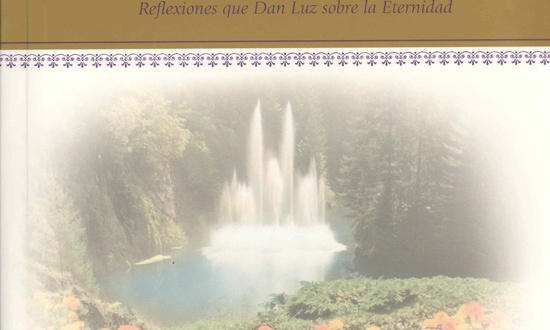Muchos vendrán del oriente y del occidente, y participarán en el banquete con Abraham, Isaac y Jacob en el reino de los cielos. — Mateo 8:11
Hasta que usted no se haya entregado a Él, no será en realidad usted mismo.— C. S. Lewis
En el libro de Charles Dickens titulado Canción de Navidad, Ebenezer Scrooge se sintió aterrorizado cuando vio un fantasma.
—¿Quién es usted?—le preguntó Scrooge.
—Pregúnteme quién era—le respondió el fantasma.
—Bien, ¿quién era usted?—dijo Scrooge.
—Cuando vivía era su socio, Jacob Marley.
En la película de Stanley Kubrick titulada 2010, David Bowman aparece en forma de fantasma. Cuando se le pregunta quién es, responde: “Yo era David Bowman.”
Estas son descripciones comunes de la vida después de la muerte, fantasmas incorpóreos que son pálidos reflejos de la vida anterior de una persona, flotando en el otro mundo. Pero estas historias no reflejan con exactitud lo que serán nuestras vidas en la Nueva Tierra. Una parte central de nuestra resurrección corporal será la continuidad de nuestra identidad. Si el Cielo eterno fuera un estado incorpóreo, entonces nuestra humanidad sería disminuida o trascendida, y nunca más seríamos nosotros mismos después que morimos.
Compare el fantasma de Jacob Marley con Job, quien dijo: “Y cuando mi piel haya sido destruida, todavía veré a Dios . . . yo . . . y no otro” (Job 19:26-27).
Compare el fantasma que había sido Dave Bowman con el Jesús resucitado, quien dijo: “Miren mis manos y mis pies. ¡Soy yo mismo! Tóquenme y vean; un espíritu no tiene carne ni huesos, como ven que los tengo yo” (Lucas 24:39).
Jesús llamó por sus nombres a las personas en el Cielo, incluyendo a Lázaro en el Cielo presente (Lucas 16:25) y a Abraham, Isaac y Jacob en el Cielo futuro (Mateo 8:11). Un nombre denota una identidad distintiva, un individuo. El hecho de que las personas en el Cielo van a ser llamadas por el mismo nombre que tenían en la Tierra demuestra que permanecen siendo las mismas personas—sin las partes malas— para siempre.
Usted será usted mismo en el Cielo. ¿Qué otra persona sería?
Si Roberto, un hombre en la Tierra, ya no es Roberto cuando llegue al Cielo, entonces Roberto no fue en realidad redimido y Roberto no fue al Cielo. Cuando yo llegue al Cielo, de la forma en que sea cambiado, si no soy la misma persona que era en la Tierra—con la misma identidad, historia y memoria—, entonces yo no fui al Cielo.
Si no somos nosotros mismos en la vida venidera, entonces, ¿cómo podemos ser recompensados o se nos pueden pedir cuentas por cualquier cosa que hayamos hecho en esta vida? El juicio no tendría significado. Las doctrinas del juicio y de las recompensas eternas dependen de que las personas retengan sus identidades distintivas de esta vida en la siguiente.
En el budismo, el hinduismo y el misticismo de la nueva era, la individualidad es borrada o asimilada en el Nirvana. Sin embargo, de acuerdo a la Biblia, nosotros no perderemos nuestra identidad cuando veamos a Dios, aunque tal vez nos sintamos perdidos en su inmensidad. “El que pierda su vida por mi causa, la encontrará” (Mateo 16:25).
Al igual que nuestro código genético y nuestras huellas digitales ahora son únicos, deberíamos esperar lo mismo de nuestros nuevos cuerpos. Dios es el Creador de las identidades y las personalidades individuales. Él no hace dos copos de nieve iguales, mucho menos a dos personas iguales. Ni siquiera los “gemelos idénticos” son completamente idénticos. La individualidad precedió al pecado y a la maldición. Es el plan de Dios, y él recibe mayor gloria a través de nuestras diferencias.
Los habitantes del Cielo no se regocijan simplemente por las multitudes sin nombre que llegan a Dios. Se regocijan por cada una de las personas (Lucas 15:4-7, 10). Esa es una poderosa afirmación de la perspectiva del Cielo para cada persona como un individuo separado, cuya vida es observada y cuidada.
Cuando Moisés y Elías aparecieron del Cielo al lado de Cristo en la transfiguración, los discípulos los reconocieron como las personas individuales que eran. Cuando Jesús fue resucitado, él no se convirtió en otra persona; él permaneció siendo el que había sido antes de su resurrección. “¡Soy yo mismo!” En el evangelio de Juan, Jesús trata a María, a Tomás y a Pedro de manera muy personal, basándose en su conocimiento anterior de ellos. Sus relaciones de su estado antes de la resurrección continuaron. Cuando Tomás dijo: “¡Señor mío y Dios mío!” ( Juan 20:28), él sabía que estaba hablando con el mismo Jesús que había seguido. Cuando Juan dijo: “¡Es el Señor!” ( Juan 21:7), él quiso decir: “Es verdaderamente él, el Jesús que conocemos.”
“‘Porque así como perdurarán en mi presencia el cielo nuevo y la tierra nueva que yo haré, así también perdurarán el nombre y los descendientes de ustedes,’ afirma el Señor” (Isaías 66:22). Nuestra historia personal y nuestra identidad perdurarán de una Tierra a la siguiente. Jesús dijo que bebería el fruto de la vida con sus discípulos en el reino de su Padre (Mateo 26:29).
¿Nos llamarán por nuestros nombres terrenales en el Cielo? Cuando se dice que los nombres de los hijos de Dios están escritos en el libro de la vida del Cordero (Apocalipsis 20:15; 21:27), yo creo que esos son nuestros nombres terrenales: Abraham, Isaac y Jacob, por ejemplo. Nuestros nombres reflejan nuestra individualidad. Que tengamos el mismo nombre escrito en el Cielo que fue nuestro en la Tierra habla de la continuidad entre esta vida y la vida venidera.
Además de nuestros nombres terrenales, recibiremos nuevos nombres en el Cielo (Isaías 62:2; 65:15; Apocalipsis 2:17; 3:12). Pero los nuevos nombres no invalidan nuestros primeros nombres.
Un hombre me escribió expresando su temor de perder su identidad en el Cielo: “¿Ser como Jesús significará la eliminación total del yo?” Él tenía miedo de que todos fuéramos iguales, que él y sus amados amigos perdieran los rasgos que los distinguen y las excentricidades que los hacen especiales. Pero él no debe preocuparse. Todos podemos ser iguales a Jesús en carácter, y sin embargo permanecer muy diferentes los unos a los otros en cuanto a la personalidad.
La diversidad es creación de Dios, no de Satanás. Lo que nos hace únicos y distintos sobrevivirá. De hecho, mucha de nuestra singularidad tal vez sea descubierta por primera vez. Seremos personas reales con deseos reales, pero santos. Tendremos sentimientos reales, pero redimidos del orgullo y de la inseguridad y de la mala manera de pensar. Seremos nosotros mismos, con todo lo bueno y nada de lo malo. Y consideraremos, en el sentido correcto, un privilegio ser quienes Dios ha creado para que seamos.
¿Anhela usted ser sí mismo, sin las cosas que se interponen para que sea la persona que Dios diseñó para que fuera? ¿Qué pasos puede dar hoy para llegar a ser esa persona en este lado del Cielo?
Señor, por un lado queremos ser liberados de nosotros mismos, libres de la confusión y los motivos equivocados, el orgullo, el egoísmo, el odio por nosotros mismos, y todo lo que exalta el “yo.” Pero al decir esto, lo que queremos decir es que deseamos ser las personas que tú quisiste que fuéramos. Queremos ser los portadores singulares de tu imagen que tú has creado, y también queremos ser como Jesús. Anhelamos ser nosotros mismos sin las partes malas, libres al fin para ser como tú nos creaste para que fuéramos. Gracias porque ya nos has redimido y nos has dado una naturaleza recta en Cristo. Ayúdanos para considerarnos muertos al pecado y vivos a la justicia. Ayúdanos a vivir de una forma que sea consecuente con nuestra nueva naturaleza, creciendo todos los días para ser más semejantes a Cristo.
Extracto de 50 Días del Cielo by Randy Alcorn, Día 33.
Being Ourselves In Heaven (Excerpt from 50 Days of Heaven)
Many will come from the east and the west, and will take their places at the feast with Abraham, Isaac and Jacob in the kingdom of heaven. — Matthew 8:11
Until you have given up your self to Him you will not have a real self. — C. S. Lewis, Mere Christianity
In Dickens’s A Christmas Carol, Ebenezer Scrooge was terrified when he saw a phantom.
“Who are you?” Scrooge asked.
“Ask me who I was,” the ghost replied.
“Who were you then?” said Scrooge.
“In life I was your partner, Jacob Marley.”
In Stanley Kubrick’s movie 2010, Dave Bowman appears in ghostly form. When asked who he is, he replies, “I was David Bowman.”
These are common portrayals of the afterlife, disembodied ghosts—pale reflections of a person’s former self—floating in a nebulous netherworld. But these stories do not accurately reflect what our lives will be like on the New Earth. A central part of our bodily resurrection will be the continuity of our identity. If the eternal Heaven were a disembodied state, then our humanity would either be diminished or transcended, and we would never again be ourselves after we die.
Contrast Jacob Marley’s ghost with Job, who said, “After my skin has been destroyed, yet in my flesh I will see God; I myself will see him with my own eyes—I, and not another” (Job 19:26-27).
Contrast the ghost that was Dave Bowman with the risen Jesus, who said, “Look at my hands and my feet. It is I myself! Touch me and see; a ghost does not have flesh and bones, as you see I have” (Luke 24:39).
Jesus called people by name in Heaven, including Lazarus in the present Heaven (Luke 16:25) and Abraham, Isaac, and Jacob in the future Heaven (Matthew 8:11). A name denotes a distinct identity, an individual. The fact that people in Heaven can be called by their earthly name demonstrates that they remain the same people—without the bad parts—forever.
You will be yourself in Heaven. Who else would you be?
If Bob, a man on Earth, is no longer Bob when he gets to Heaven, then Bob was not actually redeemed and Bob did not go to Heaven. When I arrive in Heaven, however changed I will be, if I’m not the same person I was on Earth—with the same identity, history, and memory—then I didn’t go to Heaven.
If we aren’t ourselves in the afterlife, then how can we be rewarded or held accountable for anything we did in this life? The Judgment would be meaningless. The doctrines of judgment and eternal rewards depend on people retaining their distinct identities from this life to the next.
In Buddhism, Hinduism, and New Age mysticism, individuality is obliterated or assimilated into Nirvana. But biblically, even though we may feel lost in God’s immensity, we will find our identity when we see him. “Whoever loses his life for me will find it” (Matthew 16:25).
As our genetic code and fingerprints are unique now, we should expect the same in our new bodies. God is the Creator of individual identities and personalities. He makes no two snowflakes alike, much less two people. Not even “identical twins” are completely identical. Individuality preceded sin and the Curse. It’s God’s plan, and he receives greater glory through our differences.
Heaven’s inhabitants don’t simply rejoice over nameless multitudes coming to God. They rejoice over each and every person (Luke 15:4-7, 10). That’s a powerful affirmation of Heaven’s view of each person as an individual, whose life is observed and cared for.
When Moses and Elijah appeared out of Heaven at the Transfiguration, the disciples recognized them as the distinct individuals they were. When Jesus was resurrected, he didn’t become someone else; he remained who he had been before his resurrection: “It is I myself!” In John’s Gospel, Jesus deals with Mary, Thomas, and Peter in very personal ways, drawing on his previous knowledge of them. His relationships from his preresurrected state carried over. When Thomas said, “My Lord and my God” (John 20:28), he knew he was speaking to the same Jesus he’d followed. When John said, “It is the Lord” (John 21:7), he meant, “It’s really him—the Jesus we have known.”
“ ‘As the new heavens and the new earth that I make will endure before me,’ declares the Lord, ‘so will your name and descendants endure’ ” (Isaiah 66:22). Our personal history and identity will endure from one Earth to the next. Jesus said that he would drink the fruit of the vine again, with his disciples, in his Father’s kingdom (Matthew 26:28).
In Heaven, will we be called by our earthly names? When it says that the names of God’s children are written in the Lamb’s Book of Life (Revelation 20:15; 21:27), I believe those are our earthly names. God calls people in Heaven by their earthly names—Abraham, Isaac, and Jacob, for instance. Our names reflect our individuality. To have the same name written in Heaven that was ours on Earth speaks of the continuity between this life and the next.
In addition to our earthly names, we’ll receive new names in Heaven (Isaiah 62:2; 65:15; Revelation 2:17; 3:12). But new names don’t invalidate the old ones.
A man wrote me expressing his fear of losing his identity in Heaven: “Will being like Jesus mean the obliteration of self?” He was afraid that we’d all be alike, that he and his treasured friends would lose the distinguishing traits and eccentricities that make them special. But he needn’t worry. We can all be like Jesus in character yet remain very different from one another in personality.
Distinctiveness is God’s creation, not Satan’s. What makes us unique will survive. In fact, much of our uniqueness may be uncovered for the first time. We’ll be real people with real desires, but holy ones. We’ll have real feelings, but feelings redeemed from pride and insecurity and wrong thinking. We’ll be ourselves—with all the good and none of the bad. And we will consider it, in just the right sense, a privilege to be who God has made us to be.
Do you look forward to being yourself, without any of the things that get in the way of being the person God designed you to be? What steps can you take today to become more that person on this side of Heaven?
Lord, on the one hand, we want to be liberated from ourselves, freed from confusion and wrong motives, pride, self-centeredness, self-loathing, self-everything. Yet in saying that, what we mean is that we want to become the persons you intend for us to be. We want to be the unique image-bearers you’ve made us, and we also want to be like Jesus. We look forward to being ourselves without the bad parts, free at last to be who you have made us to be. Thank you that you have already redeemed us and given us a righteous nature in Christ. Help us to reckon ourselves dead to sin and alive to righteousness. Help us to live in a manner consistent with our new nature, growing in Christlikeness every day.
Excerpt from 50 Days of Heaven by Randy Alcorn, Day 33.
Photo by Omar Lopez on Unsplash




